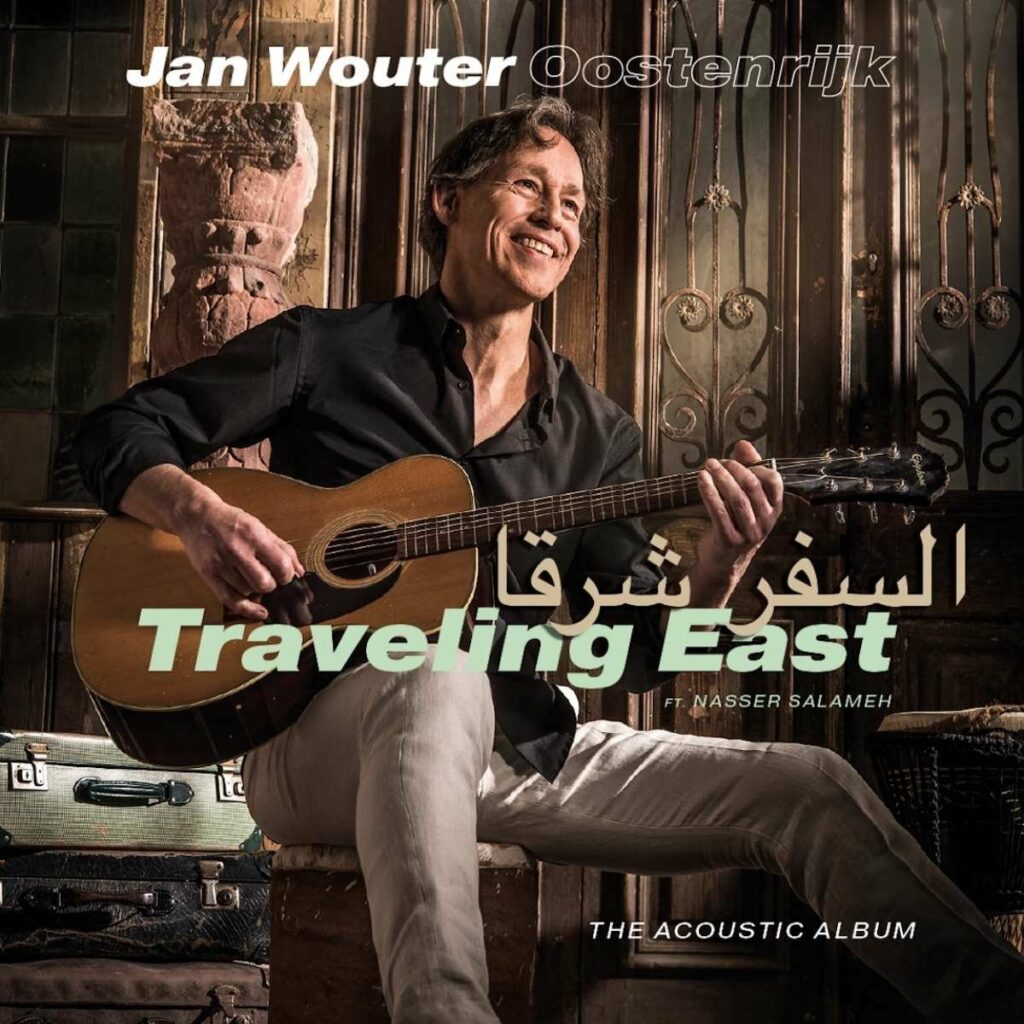Gitarist Jan Wouter Oostenrijk laat op zijn nieuwe album Traveling East de folk&jazz samensmelten met een rijke Oriëntaalse flavour.
English version below
Traveling East – The Acoustic Album is het vijfde album van de Nederlands gitarist Jan Wouter Oostenrijk, maar het is zijn eerste album waarop hij alleen akoestisch gitaar speelt. Een instrument dat hij heeft laten ombouwen tot een kwart-tonen gitaar waardoor hij zijn composities kan spelen in de Oriëntaalse toonsoorten (maqams). Hij componeerde alle werken voor dit nieuwe album, op het traditionele stuk Dorbiha Ya Chibani en Nassem Elena el Hawa na. De laatste compositie werd door de Rhabani Brothers geschreven, die ook veel muziek voor de legendarische Libanese zangeres Fairuz componeerden.
Op Traveling East wordt Oostenrijk bijgestaan door Nasser Salameh die op strakke en doortastende wijze diverse percussie-instrumenten bespeelt, waaronder de riq & daf (frame drum), darbouka (vaastrommel), tamboerijn en bekkens.
Door het gebruik van akoestische gitaar krijgt de muziek van Jan Wouter Oostenrijk een heel andere klankkleur dan we van hem gewend zijn. Niet alleen door de sound van de akoestische gitaar maar ook door het ontbreken van de effecten zoals galm en vooral distortion (fuzz). De composities hebben nu een pure sound waardoor de arrangementen open, helder klinken en soms ook breekbaar. Zelfs folky zo nu en dan (My Friend Samir), waardoor een subtiele, positieve vergelijking met Leo Kottke, John Fahey of Bob Brozman al snel opduikt. Veel vingervlug solo-werk op Traveling East, zonder effectbejag, maar fraaie solo’s waarbij thema’s of variaties verzorgd worden gespeeld. Hij speelt alle gitaarpartijen, weliswaar soms met loopstation. Een apparaat waarop hij live een korte gitaarpartij inspeelt, die zich steeds herhaalt (looped) om er vervolgens over te kunnen soleren. Zoiets horen we in de compositie Travelling East, waarop hij soleert op een ostinaat gespeelde basloop, net zoals in de enerverende compositie Displaced. Hier wordt de basloop overgoten met steeds dissonanter wordende akkoorden. Het album opent met Taqsim in Maqam Bayat. Een taqsim is een intro(ductie) van de toonsoort om de luisteraar de kans te geven te wennen aan de klankkleur van de bepaalde toonsoort. Iets soortgelijks gebeurt ook in de westerse muziek natuurlijk, alleen zijn dan de intro’s veel korter en wij hebben maar twee toonsoorten (en nog 7 kerk-toonladders natuurlijk) terwijl er in de Oriëntaalse muziek gebruik gemaakt wordt van vele toonsoorten.
Traveling East is een album waarop we Jan Wouter Oostenrijk horen in oprechte puurheid. Hij kan zich niet verschuilen achter drums, toetsen of zang, maar hier gaat hij ‘met de billen bloot’. Dat doet hij bevlogen, virtuoos en met bezieling: dat is drie-dubbel genieten.
KLIK HIER voor de review van de CD We are connected van J.W. Oostenrijk.
English version
Guitarist Jan Wouter Oostenrijk fuses folk&jazz with a rich Oriental flavor on his new album Traveling East.
Traveling East – The Acoustic Album is the fifth album by Dutch guitarist Jan Wouter Oostenrijk, but it is his first album on which he only plays acoustic guitar. An instrument that he had converted into a quarter-tone guitar so that he can play his compositions in the Oriental keys (maqams). He composed all the works for this new album, except for the traditional piece Dorbiha Ya Chibani and Nassem Elena el Hawa. The last composition was written by the Rhabani Brothers, who also composed lots of music for the legendary Lebanese singer Fairuz.
On Traveling East, Oostenrijk is assisted by Nasser Salameh, who plays various percussion instruments in a tight and decisive manner, including the riq & daf (frame drum), darbouka (vase drum), tambourine and cymbals.
The use of acoustic guitar gives the music a completely different timbre than we are used to from Oostenrijk’s music. Not only because of the sound of the acoustic guitar, but also because of the lack of effects such as reverb and especially distortion (fuzz). Now the music has a pure sound, making the arrangements clear and sometimes fragile. Even folky every now and then (My Friend Samir), so a subtle, positive comparison to Leo Kottke, John Fahey or Bob Brozman quickly pops up. A lot of dexterous solo work on Traveling East, without effect, but beautiful solos in which themes or variations are played carefully. Jan Wouter Oostenrijk plays all guitar parts, although sometimes by the use of a loop station. A device on which he plays a short guitar part live, which repeats itself (looped), so that he can play solo over it. We hear something like this in the piece Traveling East, on which he solos on an ostinato bass loop, or in the exciting composition Displaced. Here the bass loop is doused with increasingly dissonant chords. The album opens with a Taqsim in Maqam Bayat. A taqsim is an introduction to the key to give the listener the chance to get used to the timbre of the particular key. Something similar also happens in Western music, of course, but the intros are much shorter and we only have two keys (and 7 church scales of course) while Oriental music uses many different keys.
Traveling East is an album on which we hear Jan Wouter Oostenrijk in sincere purity. He can’t hide himself behind drums, keys or vocals,. He really plays with enthusiasm, virtuoso and inspiration: so that’s three times enjoyment.
CLICK HERE for the review of the CD We are connected by J.W. Oostenrijk.
*Jan Wouter Oostenrijk: Traveling East – The Acoustic Album (Mountain Records / Xango)
© Mattie Poels.


Geen reacties